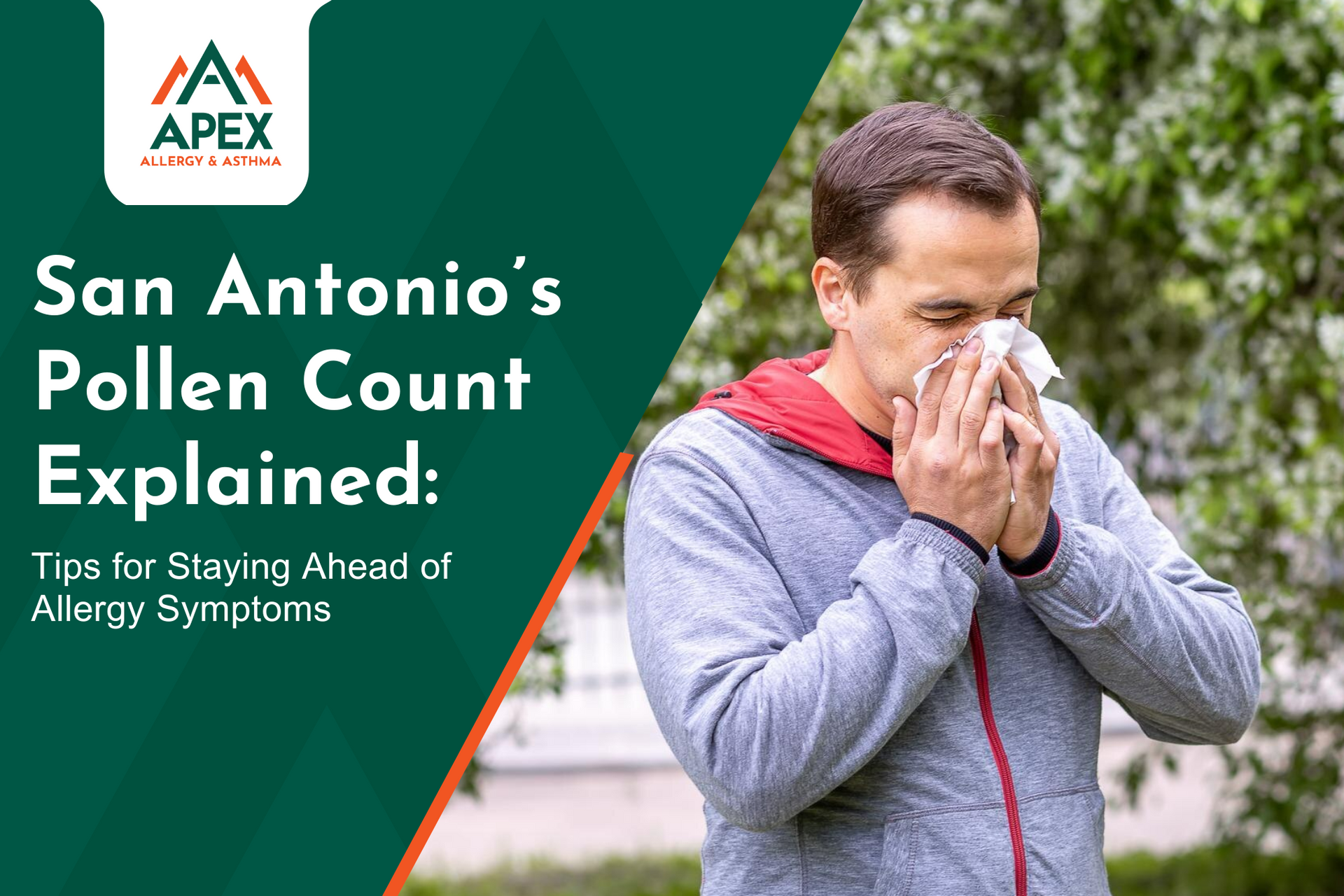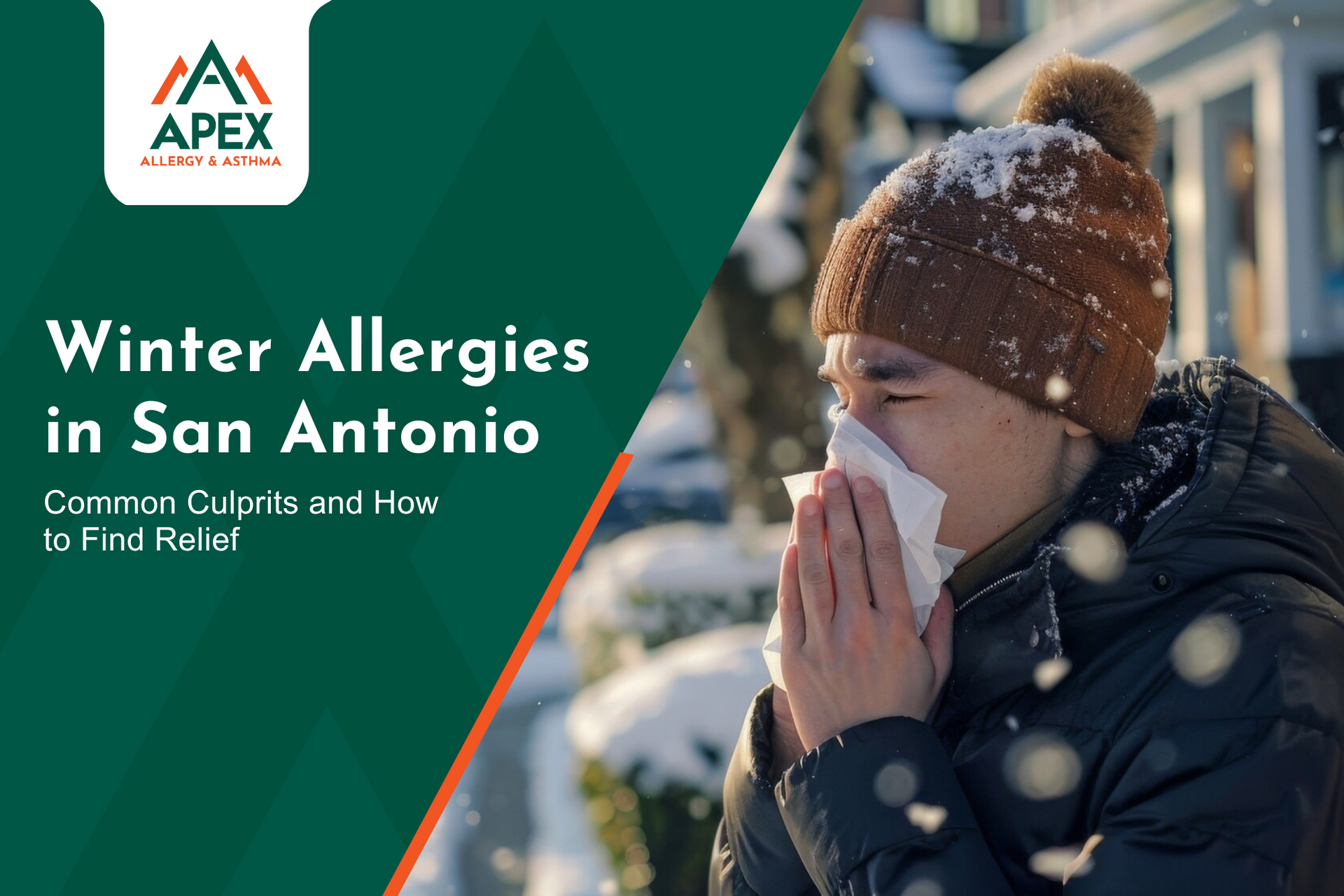The Importance of Pollen Count Tracking in San Antonio

In the heart of Texas lies the captivating city of San Antonio. While the city's beauty is undeniable, it comes with a caveat for many residents: seasonal allergies. The culprit? Pollen.
Understanding and tracking pollen counts in San Antonio isn't just a precautionary measure. It's the key to unlocking a healthier, more comfortable lifestyle.
Let's explore the importance of pollen count tracking and its significant impact on your quality of life. Here's everything you need to know about pollen count tracking in San Antonio!
What Is An Allergy?
Before we delve into the essentials of pollen count tracking, let's learn how allergies work. An allergy is an adverse immune system response to a substance that is typically harmless to most people. This substance, known as an allergen, triggers allergic reactions in sensitive individuals.
Common allergy symptoms include:
- Sneezing
- Runny or stuffy nose
- Itchy or watery eyes
- Itchy throat or ears
- Wheezing and shortness of breath
- Skin reactions
- Fatigue
- Difficulty sleeping
- Nausea or upset stomach
- Swelling
The severity of the symptoms varies from person to person. Additionally, some allergies lead to more severe reactions known as
anaphylaxis, a life-threatening reaction that necessitates a medical emergency. If you suspect you have allergies, seek prompt advice from a
healthcare professional. Allergy specialists help identify the specific allergens causing your symptoms and recommend appropriate treatment options.
Common aeroallergens in San Antonio, Texas, include:
1.
Mt. Cedar Pollen
2.
Oak Pollen
3.
Grass Pollen
4.
Ragweed Pollen
5. Mold
6.
Dust mites
7.
Cockroach allergens
The Importance of Pollen Count in San Antonio
For many residents, seasonal allergies in San Antonio are like an uninvited guest, overstaying their welcome every spring, fall, and winter. Sneezing fits, itchy eyes, and nasal congestion turn even the most peaceful day into a constant struggle. To gain the upper hand against allergies, learn the safest and most effective ways to keep them at bay.
Knowledge is Power
Tracking pollen in San Antonio empowers you to make informed decisions about outdoor activities. Since reducing accidental exposure to allergens plays a crucial role in allergy management, knowledge of pollen counts helps create a more enjoyable and less symptomatic experience. You can track daily pollen count levels in your area by visiting the AAAAI's National Allergy Bureau.
Personalized Allergy Management
Pollen count tracking allows you to tailor your allergy management methods efficiently. Knowing which specific types of pollen trigger your allergies enables you to take targeted precautions. For instance, if you're allergic to oak pollen, take extra care during peak oak pollen seasons.
Medication Optimization
Knowing the pollen count optimizes the usage and efficiency of anti-allergy drugs. It allows you to take these medications when you need them the most. This method prevents discomfort and reduces the need for emergency intervention. Most medications work best when started before or at the start of the season to prevent significant symptoms at the height of the allergy season.
Protecting Vulnerable Populations
Certain groups, such as older adults, children, and people with immune system deficiencies, are more at risk of the effects of pollen. Avoiding the outdoors on high pollen count days can help these individuals optimize their health.
Public Health Awareness
Local authorities and healthcare organizations should raise public awareness about allergy seasons by tracking and sharing pollen count information. This data is crucial for developing public health strategies and providing timely advice to the community.
Stay Informed and Protected Against Allergies
When going out to admire San Antonio's natural beauty, pollen is unavoidable, but it is not unbeatable. Staying educated and taking proactive measures allow you to breathe easier and enjoy San Antonio's splendor all year round.
FAQs About San Antonio, Texas, Pollen Count Tracking
Q: Why is pollen count tracking necessary in San Antonio?
A: San Antonio has diverse plant species that release pollen. Tracking pollen counts helps residents and healthcare professionals anticipate and manage allergy symptoms effectively.
Q: How is pollen count measured?
A: In San Antonio, pollen count gets a daily update, especially during peak pollen seasons, depending on the types of plants in the area. There are numerous devices that connect pollen counts from the air, and values are typically reported in the number of pollen grains per cubic meter of air.
Q: Who benefits from pollen count tracking?
A: Pollen count tracking benefits anyone who experiences allergies or respiratory conditions exacerbated by pollen.
Q: How often is pollen count data updated?
A: In San Antonio, pollen count data is typically updated daily during the peak pollen seasons, depending on the types of plants in the area.
Q: Where can I find pollen count information for San Antonio?
A: Local weather services, allergy-related websites, and allergy doctors in San Antonio often provide pollen count information for specific regions. The best information can be found at AAAAI.
Q: Are there specific times of the year when pollen counts are higher in San Antonio?
A: Yes, pollen counts are higher in San Antonio during the spring, fall, and winter. Different plants release pollen at other times, making peak periods vary depending on the local flora.
Q: Can pollen count tracking help for preventive healthcare?
A: Yes, pollen count tracking is a valuable tool for preventive healthcare. It allows you to plan and take necessary precautions to minimize exposure to high pollen levels, reducing the risk of allergy symptoms and related health issues.
Q: How can I use pollen count information to improve my quality of life?
A: Staying informed about pollen counts is crucial in deciding outdoor activities, travel plans, and asthma management strategies. This knowledge empowers you to take control of your health and enjoy a better quality of life, even in regions with high pollen levels like San Antonio.
Breathe Easier and Healthier in San Antonio, Texas!
You're on the right page if you're searching online for "pollen count in San Antonio today, "cedar count in San Antonio," "mold count in San Antonio," "allergy doctor in San Antonio," "allergy specialist in San Antonio," and "best allergist in San Antonio."
Now that you know the significance of pollen tracking in San Antonio, Texas, it's time to apply the tips you learned so that you can enjoy the entire year without fear of allergies!
Our board-certified
Apex Allergy and Asthma allergist is here to ensure your protection against allergies, asthma, and similar conditions. Mark Stahl, DO, and his team use proven methods based on your unique needs for better treatment and management outcomes.
Request your preferred schedule today! Contact us at (210) 490-2051 or book an appointment
here.



